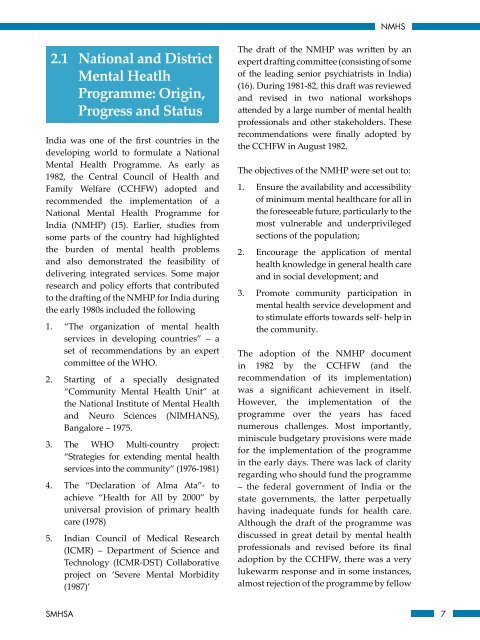National Mental Health Survey of India 2015-16
NMHS%20Report%20%28Mental%20Health%20Systems%29%201
NMHS%20Report%20%28Mental%20Health%20Systems%29%201
Create successful ePaper yourself
Turn your PDF publications into a flip-book with our unique Google optimized e-Paper software.
NMHS<br />
2.1 <strong>National</strong> and District<br />
<strong>Mental</strong> Heatlh<br />
Programme: Origin,<br />
Progress and Status<br />
<strong>India</strong> was one <strong>of</strong> the first countries in the<br />
developing world to formulate a <strong>National</strong><br />
<strong>Mental</strong> <strong>Health</strong> Programme. As early as<br />
1982, the Central Council <strong>of</strong> <strong>Health</strong> and<br />
Family Welfare (CCHFW) adopted and<br />
recommended the implementation <strong>of</strong> a<br />
<strong>National</strong> <strong>Mental</strong> <strong>Health</strong> Programme for<br />
<strong>India</strong> (NMHP) (15). Earlier, studies from<br />
some parts <strong>of</strong> the country had highlighted<br />
the burden <strong>of</strong> mental health problems<br />
and also demonstrated the feasibility <strong>of</strong><br />
delivering integrated services. Some major<br />
research and policy efforts that contributed<br />
to the drafting <strong>of</strong> the NMHP for <strong>India</strong> during<br />
the early 1980s included the following<br />
1. “The organization <strong>of</strong> mental health<br />
services in developing countries” – a<br />
set <strong>of</strong> recommendations by an expert<br />
committee <strong>of</strong> the WHO.<br />
2. Starting <strong>of</strong> a specially designated<br />
“Community <strong>Mental</strong> <strong>Health</strong> Unit” at<br />
the <strong>National</strong> Institute <strong>of</strong> <strong>Mental</strong> <strong>Health</strong><br />
and Neuro Sciences (NIMHANS),<br />
Bangalore – 1975.<br />
3. The WHO Multi-country project:<br />
“Strategies for extending mental health<br />
services into the community” (1976-1981)<br />
4. The “Declaration <strong>of</strong> Alma Ata”- to<br />
achieve “<strong>Health</strong> for All by 2000” by<br />
universal provision <strong>of</strong> primary health<br />
care (1978)<br />
5. <strong>India</strong>n Council <strong>of</strong> Medical Research<br />
(ICMR) – Department <strong>of</strong> Science and<br />
Technology (ICMR-DST) Collaborative<br />
project on ‘Severe <strong>Mental</strong> Morbidity<br />
(1987)’<br />
The draft <strong>of</strong> the NMHP was written by an<br />
expert drafting committee (consisting <strong>of</strong> some<br />
<strong>of</strong> the leading senior psychiatrists in <strong>India</strong>)<br />
(<strong>16</strong>). During 1981-82, this draft was reviewed<br />
and revised in two national workshops<br />
attended by a large number <strong>of</strong> mental health<br />
pr<strong>of</strong>essionals and other stakeholders. These<br />
recommendations were finally adopted by<br />
the CCHFW in August 1982.<br />
The objectives <strong>of</strong> the NMHP were set out to:<br />
1. Ensure the availability and accessibility<br />
<strong>of</strong> minimum mental healthcare for all in<br />
the foreseeable future, particularly to the<br />
most vulnerable and underprivileged<br />
sections <strong>of</strong> the population;<br />
2. Encourage the application <strong>of</strong> mental<br />
health knowledge in general health care<br />
and in social development; and<br />
3. Promote community participation in<br />
mental health service development and<br />
to stimulate efforts towards self- help in<br />
the community.<br />
The adoption <strong>of</strong> the NMHP document<br />
in 1982 by the CCHFW (and the<br />
recommendation <strong>of</strong> its implementation)<br />
was a significant achievement in itself.<br />
However, the implementation <strong>of</strong> the<br />
programme over the years has faced<br />
numerous challenges. Most importantly,<br />
miniscule budgetary provisions were made<br />
for the implementation <strong>of</strong> the programme<br />
in the early days. There was lack <strong>of</strong> clarity<br />
regarding who should fund the programme<br />
– the federal government <strong>of</strong> <strong>India</strong> or the<br />
state governments, the latter perpetually<br />
having inadequate funds for health care.<br />
Although the draft <strong>of</strong> the programme was<br />
discussed in great detail by mental health<br />
pr<strong>of</strong>essionals and revised before its final<br />
adoption by the CCHFW, there was a very<br />
lukewarm response and in some instances,<br />
almost rejection <strong>of</strong> the programme by fellow<br />
SMHSA<br />
7


